African LGBTQ refugees, seeking Europe, find terror in Tunisia
Colin Stewart is a 45-year journalism veteran living in Southern…
Black Africans in Tunisia, including LGBTQ asylum-seekers, have become the target of racist and homophobic violence and discrimination in the wake of an inflammatory racist speech by Tunisian President Kais Saied on Feb. 21.

Many of the black immigrants in Tunisia are trying to reach Europe, often risking their lives by paying for clandestine passage on small, overcrowded, unseaworthy vessels. For most of them, that hazardous trip comes after a similarly hazardous journey northward from sub-Saharan Africa. For examples, see the articles:
- “Two desperate Cameroon refugees’ dangerous trek toward Europe” and
- “Victimized gay couple flees Cameroon, hopes to reach Europe”.
The Cameroon-based advocacy group Working for Our Wellbeing has appealed for an end to the human rights abuses against black Africans in Tunisia, as have Human Rights Watch (HRW) and Amnesty International.
HRW reported that Saied’s speech “sparked havoc in the country,” as its “racist, conspiracy-minded language” led to “a surge in violent assaults, robberies, and vandalism by Tunisian citizens against [black Africans in the country]. HRW added:
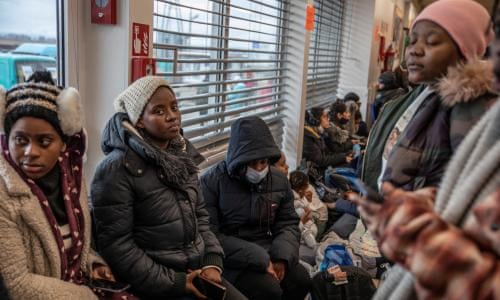
“Police are arresting black Africans for no reason. Landlords are kicking them out, and employers are firing them.
“Scores of black African foreigners, asylum seekers, and refugees – many suddenly homeless – are now camping in front of international organizations’ offices in the hope it might be safer. Others avoid venturing outside as much as possible.”
From long before Saied’s speech, racist and homophobic attacks on black refugees have been occurring in Tunisia for years, as demonstrated by testimony that Working for Our Wellbeing collected from more than a dozen LGBT refugees. The refugees — two from Ivory Coast and the rest from Cameroon — cited multiple instances of homophobic and racist beatings, rapes, extortion and robbery by native Tunisians. In each case, Tunisian police were no help and the U.N. Office of the High Commission for Refugees (UNHCR) provided little or no assistance.
Below are English translations of the French-language accounts from four of the refugees, who are identified here with pseudonyms for their safety:
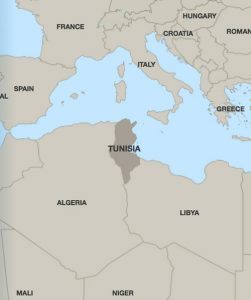
KoKo, age 29, a gay man: ‘I was beaten and raped. … I am afraid to go out to the hospital’
I arrived in Tunisia on April 21, 2021, from the Ivory Coast. I had been rejected by my family because of my sexual orientation. I was received by a classmate in Tunisia. … I was assaulted, violently beaten and raped on July 2, 2022, and I discovered that I was seriously ill with HIV. I went to the UNHCR who sent me to the psychologist who helped me psychologically but could not help me with official papers. When I came back to my classmate’s home, I found that it had been vandalized. I fled without taking anything and took refuge at my older sister’s house, where I live in hiding. If the landlord sees me he is going to throw me out. The UNHCR and Tunisian Red Crescent do not support us. My medication is finished and I am afraid to go out to the hospital.
Nora, age 29, a lesbian: ‘I am afraid to go out because it is dangerous outside’
I arrived in Tunisia on Feb. 21, 2021. … I am HIV positive and unemployed, I have suffered discrimination and stigmatization to the point where the landlord insists that we leave. Every time I appeal to the UNHCR I get no response, I am not received. … I have no medication and no money to buy any. Recently the police climbed the fence to come and kick us out. Fortunately for us the door is armored so they could not enter. I am afraid to go out because it is dangerous outside. Even being at home I am in a terrible fear. I hardly sleep because it is necessary to be on the lookout.
Landon, age 22, a gay man: ‘I am afraid for my life. I am in hiding as if I were a murderer.’
I arrived in Tunisia on July 31, 2021. I was registered at the UNHCR on Aug. 17, 2021. ….I was a victim of aggression and violence. I was sent to prison, where I was almost raped. … After I was released from prison, I returned to the UNHCR, which did not help me. … I am afraid for my life. I am in hiding as if I were a murderer.
Adele, age 29, a trans woman: ‘I was … blackmailed by my landlords, who wanted to have sex with me. When I refused, they threw me out. ‘
Since my arrival in Tunisia I have lived as a nomad because of my [gender identity and] sexual orientation. As a transgender woman, it is not easy for me. I was attacked several times, raped, blackmailed by my landlords, who wanted to have sex with me. When I refused, they threw me out. Now I am in a hostel at the UNHCR. I can’t go out in the street because I don’t know what I will be subjected to. One evening when I returned I was kidnapped by two Tunisians who pretended to be policemen. They took me to a house, locked me up for a week and raped me, one after the other. I fell ill and they released me late at night in an unknown place in a village very far from the city. I was helped by an unknown lady who loaned me her telephone.”
HRW noted that Saied has popularized a conspiracy theory that claims black Africans are moving to Tunisia in order to “replace” native Tunisians.
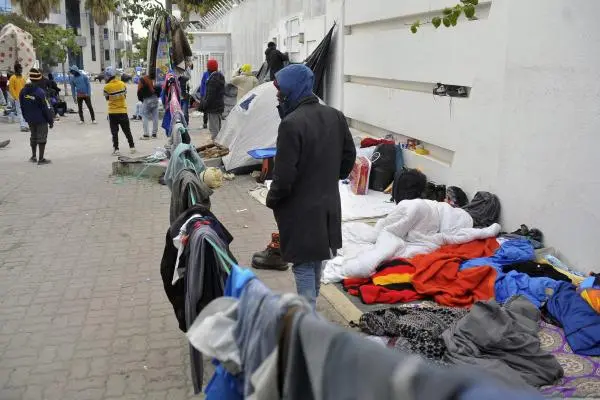
“That Saied’s language was politically irresponsible is obvious,” HRW stated. “And as with other cases, notably in Europe and the U.S., when politicians spout this kind of racist ‘great replacement’ conspiracy nonsense about foreigners supposedly taking over, the claims are not connected to reality.
“Tunisia is a country of 12 million with a minuscule 21,000 Black Africans.
“Amnesty International said President Saied was, ‘finding scapegoats for Tunisia’s economic and political woes.’ …
“In any case, nothing the presidency has done since the inflammatory speech will reverse the country’s dangerous course. Authorities have not condemned the criminal assaults nor instructed security forces to protect those at risk.
“Most critically, they are not pushing prosecutors to hold perpetrators accountable. Throughout the wave of assaults, the authorities have announced only one arrest.
“All this will only embolden potential attackers.”
An underfunded relief agency
The perpetually underfunded UNHCR says it needs $8.5 million to do its work in Tunisia this year, but so far is assured of only 39 percent of that.
This is its official description of its work, omitting any reference to its shortcomings:
“Currently, over 9,000 refugees and asylum-seekers are registered with UNHCR in Tunisia, originating mainly from the Middle East, sub-Sahara, and Africa’s horn. Most reach Tunisia by land or air from neighbouring countries, and within mixed movements, by sea or land to/from Libya/Algeria. … UNHCR works in close collaboration with authorities and Tunisian civil society to promote a favourable protection environment for refugees and asylum-seekers in Tunisia.
“UNHCR and its partners, with the essential support of donors, ensure international protection through the registration of refugees and asylum-seekers, documentation and the Refugee Status Determination procedure. UNHCR and its partners provide emergency assistance to the most vulnerable (shelter, material assistance) and a follow-up for socio-economic inclusion of persons of concern to UNHCR.”
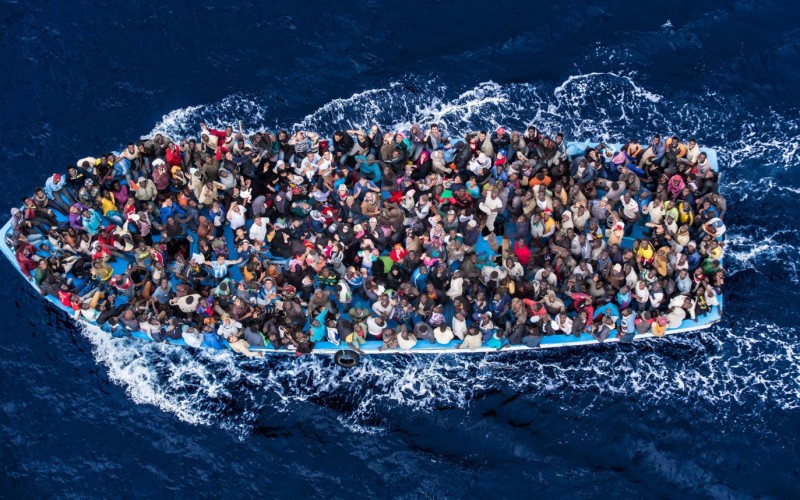
In a report on 14 migrants who drowned off the Tunisian coast on March 9, Al Jazeera stated:
“The deaths announced on Wednesday add to the grim toll of refugees drowning as they attempt the perilous crossing of the Mediterranean, the world’s deadliest migration route.
More than 25,000 people have died or have gone missing since 2014, according to data collected by the International Organization for Migration’s Missing Migrants Project.
Italy said in February that more than 32,000 people, including 18,000 Tunisians, reached its shores from Tunisia last year, while thousands more have departed from neighbouring Libya.
European governments, particularly Italy, have pressured Tunisia to stem the flow, and the Tunisian coastguard regularly intercepts boats carrying refugees in its territorial waters.
Below are edited excerpts from a report by Working for Our Wellbeing:
The Untold Stories of Black African LGBTQIA Immigrants Trapped in Tunisia
Tunisia’s first democratically elected president Beji Caid Essebsi died in July 2019. Following him, Kais Saied became Tunisia’s president after a landslide victory in the 2019 Tunisian presidential elections in October. On 23 October 2019, Kais Saied was sworn in as Tunisia’s new President with his term of office witnessing numerous unbelievable scandals.
During a statement on February 21, 2023, Saied called for the expulsion of all illegal immigrants, describing migration as a plot to alter Tunisia’s demographics so that it becomes more African and less Arab. This has particularly affected black immigrants from various African countries.
Saied’s remarks have since then sparked an uproar and has given rise to violent attacks on black Africans living in the country.
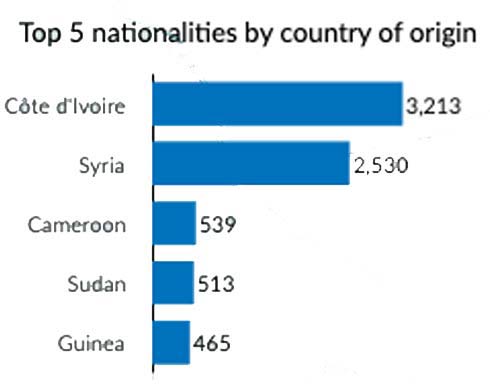
Tunisia is a major departure point for migrants seeking to cross the Mediterranean . Over the past years there has witnessed a big increase in the number of Tunisians and other Africans trying to reach Europe by this means. It is clear that most black immigrants in Tunisia are not there to look for jobs or better living conditions but rather seeking ways to transit to Europe. On that journey, they face all sorts of inhumane treatment, torture and abuse.
After the president’s declaration many black immigrants have gone in hiding. … We got in contact with 19 of them from various African countries and their stories are too hard to take. A majority of them complained of police brutality, destruction of their property by native Tunisians, and rape by both citizens and policemen. They said immigrants from other Western and European nations were treated differently from those of African origin.
Article 230 of the Tunisian Penal Code of 1913 (largely modified in 1964) decrees imprisonment of up to three years for private acts of sodomy between consenting adults. Cross-dressing is not expressly illegal, but transgender people and gay people are often accused of violating Article 226 of the national Penal Code, which outlaws “outrages against public decency”.
LGBTI refugees whom we have contacted say they cannot step an inch outside due to fear of being arrested, tortured or raped. Despite wide condemnation of these numerous atrocities, the situation doesn’t seem to be getting any better. …
Africa being one of the most homophobic continents in the World, and Tunisia particularly being an Arab Nation that upholds strict anti-gay laws, put LGBT people in great danger. They face legal challenges not experienced by non-LGBT residents.
This remains a challenging factor for black LGBT people caught up in this current crisis plaguing the nation. In the midst of Tunisia’s disorder, citizens take out their hate and disgust against black LGBT immigrants.
They indeed need our help!
For information about how to support Working for Our Wellbeing financially, visit the organization’s donations page.




